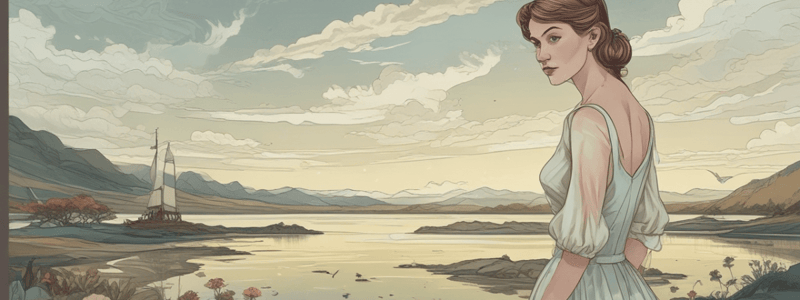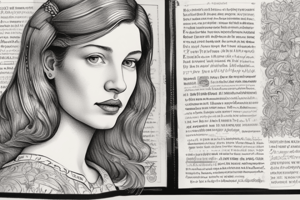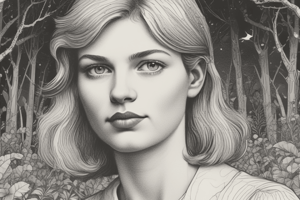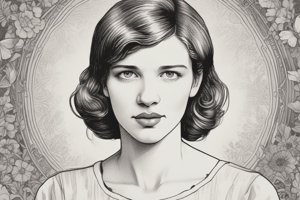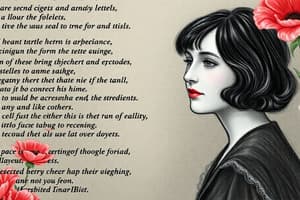Podcast
Questions and Answers
How does the enjambment between the second and third stanzas contribute to the portrayal of the child?
How does the enjambment between the second and third stanzas contribute to the portrayal of the child?
It portrays the child as a flawless stalk, growing upwards without blemish.
What is the effect of the juxtaposition of the child's joy and Plath's pain and anguish on the reader?
What is the effect of the juxtaposition of the child's joy and Plath's pain and anguish on the reader?
It is harrowing for the reader.
What is implied about Plath's state of mind by the end of the poem?
What is implied about Plath's state of mind by the end of the poem?
Not even the most beautiful things could have saved her from her depression.
What is the contrast between the child's eyes and Plath's reality?
What is the contrast between the child's eyes and Plath's reality?
Flashcards are hidden until you start studying
Study Notes
About the Poem "Child"
- Written by Sylvia Plath just before her suicide in 1963
- Addressed to her son Nicholas, taking a dark and depressing turn by the end
- Title "Child" seems positive, but lacks a sense of ownership with the word "my"
Themes and Ideas
- The innocence of children
- The beauty of her son
- Love
- Motherhood
- Depression
- Suicidal thoughts
Style
- Imagery from the natural world
- Personal tone, directly speaking to Nicholas
- Rhyme used to create euphony
- Enjambment to portray flow of thoughts
- Figurative language, including powerful metaphors
Analysis of Key Quotes
- "Your clear eye is the one absolutely beautiful thing"
- Plath speaks directly to Nicholas, expressing love and appreciation
- Wants to fill his vision with "color and ducks, the zoo of the new"
- Joyous and simple language used, with internal rhyme creating euphony
- "April snowdrop, Indian pipe"
- Nicholas is imagined reciting new words of plants and flowers
- Flowers sound appealing due to their 'p' sounds
- Juxtaposition of innocent springtime flowers and Plath's attraction to death
- "Little Stalk without wrinkle"
- Enjambment links second and third stanzas, portraying Nicholas as a flawless stalk growing upwards
- Plath considers her son's perfection
- "Pool in which images should be grand and classical"
- Plath wants her son's eyes to reflect grand and classical things
- "Not this troublous / Wringing of hands, this dark / Ceiling without a star"
- Plath is brought back to her own reality, filled with depression and anguish
- Juxtaposition of joy of the child and Plath's pain is harrowing for the reader
About the Poem "Child"
- Written by Sylvia Plath just before her suicide in 1963
- Addressed to her son Nicholas, taking a dark and depressing turn by the end
- Title "Child" seems positive, but lacks a sense of ownership with the word "my"
Themes and Ideas
- The innocence of children
- The beauty of her son
- Love
- Motherhood
- Depression
- Suicidal thoughts
Style
- Imagery from the natural world
- Personal tone, directly speaking to Nicholas
- Rhyme used to create euphony
- Enjambment to portray flow of thoughts
- Figurative language, including powerful metaphors
Analysis of Key Quotes
- "Your clear eye is the one absolutely beautiful thing"
- Plath speaks directly to Nicholas, expressing love and appreciation
- Wants to fill his vision with "color and ducks, the zoo of the new"
- Joyous and simple language used, with internal rhyme creating euphony
- "April snowdrop, Indian pipe"
- Nicholas is imagined reciting new words of plants and flowers
- Flowers sound appealing due to their 'p' sounds
- Juxtaposition of innocent springtime flowers and Plath's attraction to death
- "Little Stalk without wrinkle"
- Enjambment links second and third stanzas, portraying Nicholas as a flawless stalk growing upwards
- Plath considers her son's perfection
- "Pool in which images should be grand and classical"
- Plath wants her son's eyes to reflect grand and classical things
- "Not this troublous / Wringing of hands, this dark / Ceiling without a star"
- Plath is brought back to her own reality, filled with depression and anguish
- Juxtaposition of joy of the child and Plath's pain is harrowing for the reader
Studying That Suits You
Use AI to generate personalized quizzes and flashcards to suit your learning preferences.
